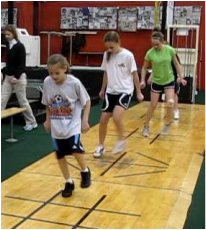YOUTH ATHLETE TRAINING AND INSTRUCTION
THAT SKILL IS ATHLETICISM
Developing athleticism will ensure your child develops exercise habits that will mold his lifestyle for years to come.
Developing athleticism will ensure your child develops exercise habits that will mold his lifestyle for years to come.
Children are like sponges when it comes to learning new movement skills. Research shows that if you try to teach them movement skills when they become physically mature, it often takes longer to learn these skills. That’s why it’s important for the development of an athlete to start at a young age!
A child needs to have a foundation of moving without a ball before you can expect them to move properly with a ball.
For example, take a young basketball player. If the child can not stop, how do we expect them to dribble and come to a jump stop? If a child can not jump and land, how do we expect them to shoot a jump shot? If a child can not run properly, how do we expect them to dribble while running?
|
Just like anything else in life, you need a good foundation in order to succeed. You need to learn algebra before you can do calculus. You need to teach kids how to move before they can become a great athlete and excel in a certain sport. You can have extremely-skilled players who never make it to the next level, because they were not athletic. And this could be a result of them never learning how to move properly. This can be taught when they’re older, but it’s much more effective to GUIDE them at a young age. |
|
YOUTH ATHLETE NUTRITION
Proper nutrition is a key component of performance at any age. Children have different nutrition needs than adults, owing to a variety of factors: children expend more energy during movement, burn more fat while exercising and are less efficient at thermoregulation (body temperature control) (Meyer, O’Connor & Shirreffs 2007). A young athlete’s accelerated activity exacerbates these differences. Poor nutrition habits before, during and after a sporting event can increase the likelihood of heat illness and dehydration, hindering performance. Repeated deficiencies can increase the likelihood of certain serious injuries and also impair growth (Petri et al. 2004). The unique demands and possible serious risks involved with a young athlete’s nutrition makes it crucial that you address this topic appropriately.








